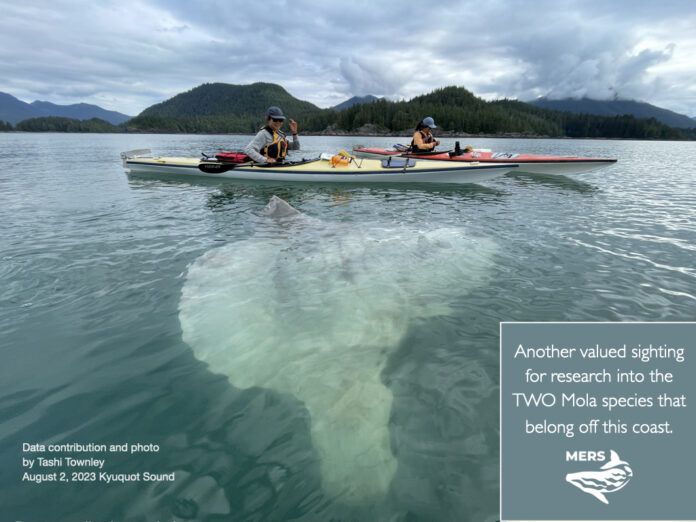It is a very striking image.
That’s how Humpback researcher and communications and education lead for the Marine Education Research Society Jackie Hildering described the photo of an ocean sunfish taken off the coast of Vancouver Island.
The photo was taken last month at Kyuoquot Sound by Tashi Townley, showcasing the mola mola beside two kayaks.
Hildering says this photo is valuable to the mola project being run by the society.
“This is one of the two species, the mola mola, and it’s showing how big they are and how extraordinarily they are adapted,” said Hildering.
“This big flat fish with fins where you don’t expect them to be with a small mouth. It is beautiful in showing perspective because it’s beside two kayaks and on an angle where the visibility in the water is so good, you can see the size and shape.”
Hildering says there are two species, one being the mola mola/ocean sunfish, and the other as the mola tecta/hoodwinker sunfish.
She also says the society got involved with the mola project after the species was recognized and published as a distinct species in 2017 and was named by the researcher in New Zealand as the hoodwinker mola and mola tecta.
“The presumption was they were a warm water species, but in 2019 the researcher Dr. Marianne Nyegaard saw a photo of a stranded Mola off San Diego, and that was misidentified as the other mola, but it was actually the one she researched and named,” said Hildering.
“During Covid it led her to look how far actually are these ones up to the north, and that led to a blog that I had written.”
Because of the blog, she adds the society was approached as a far-north sighting for the other species of mola and got involved in the study to use their networks to find out how many and where these two species are.
“There’s something there in people having the humility, precaution, and understanding of how little we actually know about the ocean,” said Hildering.
“So, the education and conservation piece are tied into how extraordinary the fish is, that there are two kinds in our waters, and attached to that as well is what else don’t we know?”
If you have taken photos of the mola, a data form can be found on the society’s website.




